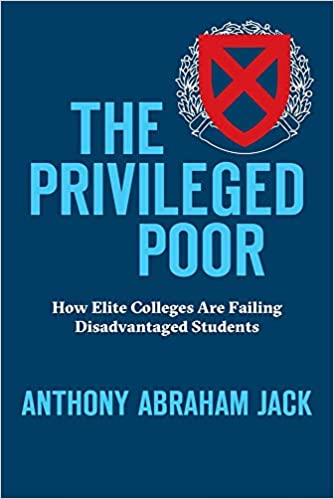You have /5 articles left.
Sign up for a free account or log in.
 The Privileged Poor: How Elite Colleges Are Failing Disadvantaged Students by Anthony Abraham Jack
The Privileged Poor: How Elite Colleges Are Failing Disadvantaged Students by Anthony Abraham Jack
Published in March 2019
Everyone I know in higher education -- and at this point in my career, I know quite a few of you -- is 100 percent dedicated to the idea of college as an engine of opportunity. We may disagree on the methods in which universities should operate, but we agree that the university plays an indispensable role in creating a just society.
One of the strongest areas of higher ed cultural consensus around ends, if not means, is the desire for our institutions to serve the least privileged. The goal that our colleges and universities provide pathways for entry, inclusion and success among first-generation and low-income students is widely shared.
This is why sociologist Tony Jack’s book The Privileged Poor is so essential. Our higher ed community very much needs a shared language and a set of research-based recommendations when it comes to designing and running institutional efforts and initiatives intended to level the postsecondary playing field.
After reading The Privileged Poor, it is impossible not to look at how colleges and universities serve (or fail to serve) low-income, first-generation and minoritized students. Jack’s critical insight (among many insights) is that disadvantaged students are not a monolithic group. Instead, these students come to our campuses from various paths -- and require different approaches if we wish to move from access to inclusion.
The Privileged Poor is based on Jack’s sociology dissertation at Harvard University. The book describes the results of Jack’s ethnographic work at "Renowned University," the pseudonym he uses for Harvard. Jack is now a professor at the Harvard Graduate School of Education and a Radcliffe Fellow.
What Jack discovered in his research is that disadvantaged students end up at elite institutions via two pathways. A sizable proportion of all low-income, underrepresented students have experience in private prep school. These students are described as the "privileged poor." In contrast, low-income minority students who make it to elite universities from underresourced public high schools can be described as "doubly disadvantaged."
By both conducting in-depth interviews and embedding himself fully in the lives of both of these groups, Jack discovers that members of the privileged poor and the doubly disadvantaged lead very different lives. Both groups have significant challenges at elite institutions, with a common denominator being the simple lack of cash to cushion the college experience. (No university leader who reads this book will ever agree to close the dining hall during breaks ever again.)
Where the experiences of the privileged poor and the doubly disadvantaged differ is in how each group navigates college life. Students with high school experience in prep school come to college knowing the hidden curriculum of college life. They know how to interact and network with professors. They have learned how to self-advocate, negotiate status hierarchies and unleash hidden resources.
Disadvantaged students from public high schools have arrived at elite institutions due to their hard work and brilliance. But they will not know the subtle and unspoken cultural norms and implicit rules that govern academic life.
Some basic recommendations that Jack makes are for faculty to stop making assumptions about what is common knowledge. Among these behavioral changes are defining the goal of office hours and explicitly inviting all students to attend.
Beyond advice to professors, Jack argues that institutions must invest in all learners’ social and emotional well-being. Ensuring student success must go beyond narrow definitions of academic support and must include care for the whole person.
Earlier this week, I recommended that colleges and universities include a reading and discussion of Adam Harris’s new book on the history and importance of HBCUs, The State Must Provide, as part of institutional DE&I efforts. The Privileged Poor should also certainly be included in any strategy to bring books and scholarship into this conversation.
What are you reading?




